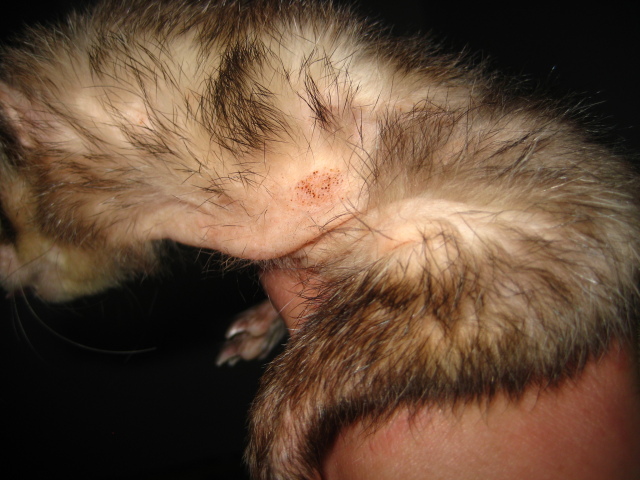QuestionI do not know the age of my ferrets. I have 2 females, but feel they are 2 or 3 years old. I teach grades 1-6 and inherited the animals from the Kindergarten teacher. I have had some concerned parents about the ferrets and their child's allergies to pet dander. I have also had some question the safety. I have done some research and feel they are safe. They are very loving and other than some occasional scratching they are not highly distracting. The kids love them but I do not want to keep them if it causes allergic reactions in some of my students. Thank you
AnswerHi Janie!
Thanks for your question. I can understand your concerns, especially in today's society and with as many allergies as people have, it is a legitimate concern.
Fortunately, in all my experience I've only come across one person who really developed an allergy to her ferrets after a few years of owning them. I know several people who are allergic to cats and/or dogs and they are not allergic to ferrets, so I think actual allergies to ferrets are pretty rare. If a child was allergic to cats and/or dogs, there is a very good chance he/she would not be allergic to ferrets anyway. I think I wouldn't worry about that until it happened. A LOT of ferrets are 'classroom pets' and seem to work out very well, both for the ferrets and the children.
The biggest thing you would need to know before taking your ferrets to school is that ferrets *can* get both canine distemper and rabies. Both of these diseases are highly transmittable; so if any of the children even walked on a sidewalk that an animal had walked with distemper, he/she could carry that virus and the ferrets could become ill. Both diseases are almost sure death sentences for ferrets.
For that reason, you would want to be sure that your ferrets are vaccinated yearly for both rabies and distemper. This also gives you some protection just in case a child should ever be scratched or bitten for some reason. If an unvaccinated ferret scratches or bites and it is reported, the animal is *always* destroyed. If you have current proof of vaccinations and a bite or scratch occurs, the animal is usually only placed in quarantine for a period of time.
Rabies and distemper shots should never be given on the same day, as reactions to them are not uncommon in ferrets. It is a good idea to have the animals 'pre-treated' with a benadryl shot at the vet's office, then wait about 20 mins before the vaccination is given. Then stay at the vet's office for 1/2 hour afterwards just in case of an allergic reaction to the vaccination. The older the pet is, the more vaccinations they have, the more likely they are to have a reaction. Reactions are most common in ferrets over 3 years old and are quite often fatal. You can greatly reduce the ferrets chance of living thru a reaction if the ferret has been pre-treated with benadryl and if you are at the vet's office if/when the reaction occurs (usually within 1/2 hour of the vaccination.
My little female ferret had a reaction to her distemper vaccination when she was 4. Even tho she had been pre-treated, it took less than a minute after the shot and suddenly blood shot out of her mouth and anus, her body went into convulsions and her heart stopped. Fortunately she had been pre-treated, so she had *some* benadryl in her and the vet was still standing right there when the reaction happened, but for the next three hours it was touch and go as the vet fought for her life, giving shots into Kylie's heart twice when it stopped - but she actually lived thru the experience! Had she not been pre-treated, she definitely wouldn't have lived thru that. It was the most frightening thing I've ever witnessed, so that's why I tell the story - so people will understand how important that pre-treatment and waiting at the vet really are.
If I were in your shoes, I think I would address any parental concerns by stating that it is very very unusual even for people who have multiple allergies to be allergic to ferrets. Let them know that if any child exhibits any indication of an allergy that you will be happy to leave the ferrets at home (or take them to a different room when that child is in the classroom). Also, be sure to reassure the parents that the ferrets have had all their vaccinations (and you might want to keep a copy of the vaccination certificates handy) just so they know you are being responsible in having the ferrets in the classroom.
Ferrets are awesome creatures and there is so much children can learn from them - how to handle them lovingly and safely, etc. I highly recommend the book "Ferrets for Dummies" by Kim Schilling. That's a great book for both new and experienced ferret owners - every ferret owner should have a copy of it. I think having ferrets in the classroom is a great way to teach kids responsibility and compassion and my personal feeling is that ferrets are excellent classroom pets. I hope you do take them home with you at night, and that they do get their 2 to 3 hours of 'out of cage playtime' daily. Weekends would be terribly lonesome for them if they were left in the classroom, as they are such social creatures. Also, things can happen and no one would be there to help - such as one of them getting sick, getting a toenail caught in bedding (I've heard of ferrets actually ripping toes off trying to free themselves when they are left alone and get into trouble like that).
Those are about the only suggestions I would have. I think it's a great idea to take them to school with you. Even better if they are used as a learning tool with the children, the responsibility of learning to care for them, etc. They are a very common classroom pet and as long as they are not biters and seem to like the children's company - no doubt a lot more positive will come from having them in the classroom than any potential negatives.
I think if I were in your shoes I might consider sending a 'permission slip' home with each child telling as much as possible about the ferrets and allowing each child's parents to decide if they want their child to be permitted to handle the ferrets. That way, it removes some degree of responsibility from you. You could reassure the parents that the ferrets have never bitten anyone, they have been examined by a vet and they have their vaccinations up to date, and the things you hope the children will learn from having the ferrets in the classroom as far as responsibility, compassion, etc. That way, if there is a child with overly protective parents or a child with severe allergies, you have the red flag in advance of any potential problems. Just a suggestion tho.
Best of luck in your endeavor! I think the children and the ferrets will both benefit from the arrangement with just a few precautions and pre-planning. If there is any way I can help in the future, please don't hesitate to contact me again.
jacquie

 Female Behavior Issues
QuestionQUESTION: I have had Ryoko, my female ferret, f
Female Behavior Issues
QuestionQUESTION: I have had Ryoko, my female ferret, f
 Skin Condition
Question
Chewie
I own 5 ferrets, ranging from 3 to 5. I
Skin Condition
Question
Chewie
I own 5 ferrets, ranging from 3 to 5. I
 Crazy Ferret
Question
Tweedle and Drew
My son brought home a ferret
Crazy Ferret
Question
Tweedle and Drew
My son brought home a ferret
 Elderly ferret
Question
Booger
Hi,
I rescued an older ferret named Bo
Elderly ferret
Question
Booger
Hi,
I rescued an older ferret named Bo
 Ferret colors
Question
Mitch
Hello Cindy!
I have just adopted a new
Ferret colors
Question
Mitch
Hello Cindy!
I have just adopted a new